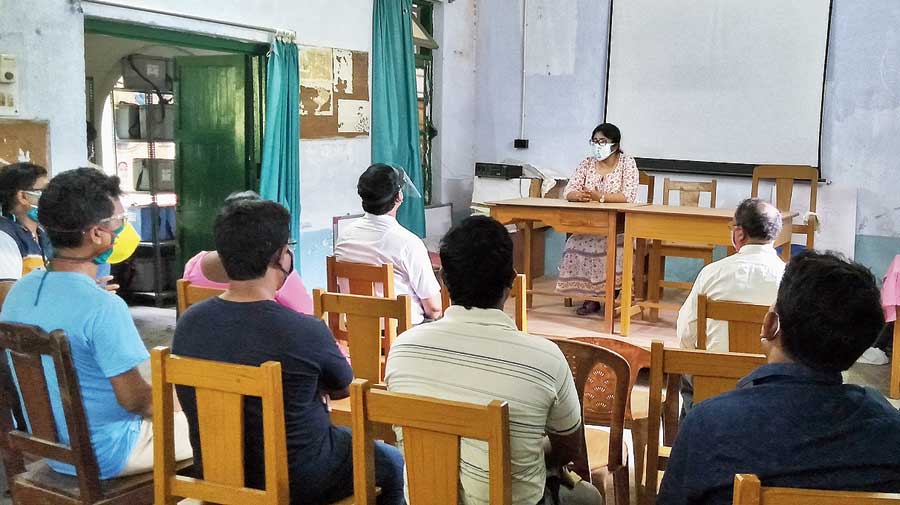The state government will enlist the help of rural health providers, who are officially recognised as grameen swasthya parisevaks and enlisted as informal healthcare providers (IHCP), in order to contain the spread of Covid-19 in rural areas.
Sources said the state government took the step to ramp up their capacity to guide and counsel the increasing number of patients in home isolation. Districts like North 24-Parganas, Nadia, Birbhum, and Murshidabad, where around 80 per cent of people live in rural areas, have recorded an exponential rise in positive cases this month like the rest of the country.
“We felt it necessary to reinforce the preventive and basic measures at rural grassroots level to combat Covid. Accredited social health activist (ASHA), anganwadi workers (AWW) and auxiliary nurse midwife (ANM) are doing their best. Nevertheless, the service of the grameen swasthya parisevaks has also become important to contain the disease since they are the first point of contact for most patients, especially at odd hours," said director of health services Ajay Chakraborty.
These informal “physicians” are culturally connected with rural people and support them in times of need, said a health official, adding that it was expected that villagers would trust them during the pandemic.
To sensitise the grameen swasthya parisevaks, the state health directorate’s public health wing held a state-wide two-day audio-visual training and orientation programme at the block level earlier this week.
Swasthya Bhawan had directed the chief medical officers of all districts to organise the training of these grameen swasthya parisevaks.
Manoj Chakraborty, state president of the Progressive Rural Physician Welfare Association, West Bengal, an organisation of grameen swasthya parisevaks, welcomed the government’s initiative.“It is a big recognition for about 2 lakh grameen swasthya parisevaks, who have been trying their best to support Covid patients in rural areas in the absence of qualified doctors. They are risking their lives to save people,” Chakraborty said.
The initiative to train rural healthcare providers was initiated in 2009 by the Liver Foundation, which is headed by renowned gastroenterologist Abhijit Chowdhury.
Abhijit Vinayak Banerjee, who won the 2019 Nobel Prize in Economics, had played a key role with Chowdhury in gauging the social impact of training rural healthcare providers, who cover 75 per cent of the rural health care sector informally.
After the survey, conducted by the Nobel laureate and members of the Abdul Latif Jameel Poverty Action Lab—co-founded by Banerjee, his fellow economists and wife Esther Duflo, and Sendhil Mullainathan — it had encouraged chief minister Mamata Banerjee to train around 1.20 lakh of those informal rural healthcare providers across the state to reach health services in remote pockets.
Sources said the state government was now using the strength of grameen swasthya parisevaks to combat the second wave of Covid-19.
Abhijit Chowdhury, the convener of the global advisory committee and a member of the expert committee on Covid-19 in Bengal, said rural healthcare providers could assume a major role in combating the deadly virus.
“They are not doctors, but rural people go to them first if they feel sick. So, those rural health care providers can track symptoms and send them for a test or help positive patients get to the hospital with a link-up to the state health department,” said Chowdhury.











